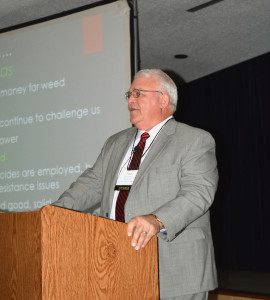Bryan, Texas, USA
December 22, 2015
Farmers need to continue to be vigilant in rotating herbicides to defend against the threat of glyphosate-resistant herbicides, according to Texas A&M AgriLife Extension Service specialist.
At the recent Texas Plant Protection Association Conference in Bryan, several talks addressed new technology and continuing weed control, plus a number of awards were presented during the annual business meeting.
Dr. Paul Baumann, AgriLife Extension state weed specialist, College Station, told attendees that weed resistance issues in Texas will continue in the future.
“We’ve got to keep the pressure on whether we are talking about common waterhemp or using alternative chemistries,” he said. “You just can’t let it go.”

Dr. Paul Baumann, Texas A&M AgriLife Extension Service state weed specialist, discussed weed control issues at the recent Texas Plant Protection Association Conference in Bryan. (Texas A&M AgriLife Extension Service photo by Blair Fannin)
Baumann said rotating herbicides in crops is a good management practice. Other than herbicides, hand-hoe labor is expensive and hard to come by.
“Unless you go out there and pull that weed up, you’ve still got to get control of it,” he said. “You’ve got to get ahead of the problem before it starts.”
Dr. Peter Dotray, Texas A&M AgriLife Research weed scientist, Lubbock, said there are a lot of fields “with lots of different biotypes.”
“If we control with the same approach year after year, you know what’s going to happen,” he said.
Dotray said just one Palmer amaranth plant has the capability of producing 500 to 600 million seed.
“Weed resistance is a real global issue that requires local solutions,” he said. “There’s no silver bullet coming in the next year or the next 10 years.”
Following the speakers, a number of agricultural professionals and students received association awards. The following were award winners:
Poster contest: Texas A&M University students John Gordy, Development of Thresholds for Management of Sugarcane Aphid on Sorghum, first place; Chase Vasbinder, Soil Nutrient Survey for Phosphorus and Potassium in the Texas Blacklands and Coastal Plains Production Regions, second place; Sarah Ajayi, Spectral Vegetation Indices for Eliminating Growth and Performance of Winter Wheat Genotypes, third place.
Pest identification winners: Dan Bradshaw, crop consultant, El Campo, first place; Stephen Biles, AgriLife Extension agent for integrated pest management, Port Lavaca, second place; Webb Wallace, crop consultant, Harlingen, third place.
Texas Plant Protection Association awards: Adam Hixson, BASF technical services representative, Industry Award; Darrin Biediger, Consultant Award; Randy Rivera, Texas Department of Agriculture, Norman Borlaug Lifetime Achievement Award.